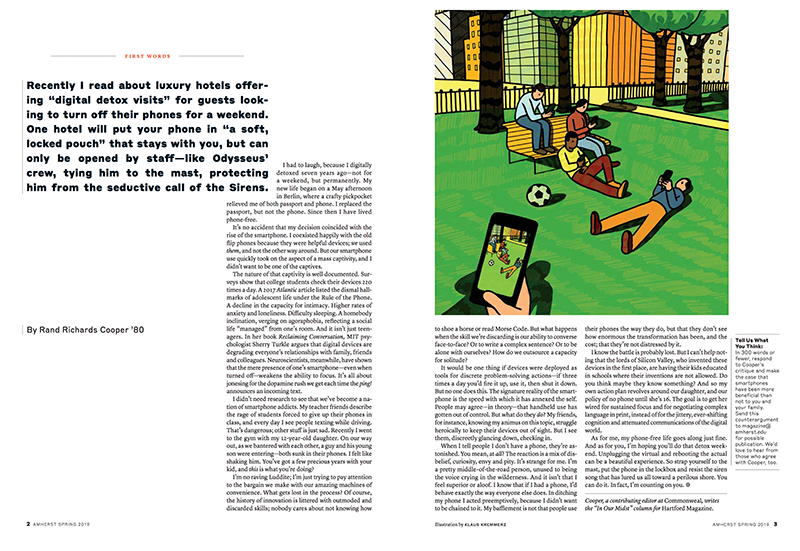Tell Us What You Think
We welcome letter submissions that respond to our magazine articles. Letters should be 300 words or fewer. Please send them to magazine@amherst.edu or Box 5000, Amherst, MA, 01002.
We welcome letter submissions that respond to our magazine articles. Letters should be 300 words or fewer. Please send them to magazine@amherst.edu or Box 5000, Amherst, MA, 01002.

Rand Richards Cooper ’80 (First Words, Spring 2019) richly describes life without phone-driven interruptions. No longer a slave to an electronic master, he presents powerful examples of the phone-versus-life tug-of-war. As a parent of three, I cringed at a particular image painted by Mr. Cooper. I refer to a father and son who are entering a gym, each absorbed in respective miniature screens, thereby squandering a chance to share impressions, discuss goals, solve a problem or swap jokes.
In the decades since my days as an undergrad, billions have been spent on creating machines that act like humans. The same efforts have resulted in humans who behave more like machines. Digital detox at luxury hotels? An adaptation of Alcoholics Anonymous would serve the greater good.
John E. Frenett P’18
Spencerport, N.Y.

The smartphone is obviously damaging social intercourse. At my family Thanksgiving dinner last year, after eating, when formerly we would have been talking, six out of eight people present, including my 8-year-old great-nephew and 76-year-old sister, were using their phones or tablets. I commented that there wasn’t much sense in getting together if we weren’t going to interact together, and went for a long walk.
It’s my observation that many smartphone addicts can’t write persuasively, can’t concentrate for any length of time and don’t seem able to determine the relative values of the overwhelming amounts of information they receive. My wife, who uses a tablet for hours every day, seems just as interested in a notice that a dog has been lost on the other side of town as she is to know that hundreds have been killed in a terrorist attack.
I check email, etc., most days, from my desktop computer, but only when I want to. The idea of being constantly available to anyone who wants to contact me at any time is anathema.
Lawrence E. Merrill ’66
Orrington, Maine
Rand Richards Cooper: brilliant! I am thankful every day that I had the privilege of raising my children in a world lacking cell phones and all the anxiety they produce. My children are grown now and have told me, “Hey, Mom, don’t call me; just text—it’s easier!” Also, “Don’t leave me a message. I won’t listen to it.” Ugh. When did communication get reduced to this sad and lonely level? Sometimes I want to hear their voices! Is there something wrong with that? I don’t think so. I applaud your rejection of digital devices and your efforts to raise your daughter in a world where she can actually talk to people and look them in the eye. I hope there are more like you.
Kathryn Swihart
Key West, Fla.
Smartphones are popular in large part because they protect users from the awkwardness and discomfort of eye contact. In my commuting days on the subway and Long Island Railway, we protected ourselves with the Times folded, raised and blocking any chance of eye contact. Primitive eye contact meant hostility— “Out of my way, or I’ll knock you and your steed off the bridge.” New York pedestrians know not to look at an approaching taxi or the power clash is lost. From these encounters grew the useful wisdom not to trust anyone who looks you straight in the eye. Ergo, the smartphone.
Bill Sayres ’53
Topsham, Maine
Going phone-free is a luxury that I wish I had. But I work in health care, where communication is done over seconds to minutes and cannot wait for a thrice-a-day check, and where it is a huge benefit to have a mass of knowledge that can fit into my pocket. Once I leave the hospital, I work (unsuccessfully) to put my device away. Mr. Cooper thinks people don’t see the transformation and that they’re not distressed by it; to the contrary, my own addiction is quite disturbing! But as someone who’s forced to use the technology, it’s incredibly hard to turn away from it at the end of the day.
Maddie Giegold ’13
Atlanta
Thank you, Rand Cooper, for bringing some sanity to the discussion of what today’s cell phones are doing to us all. One of my great heroes, Edward Abbey, shot his television; that’s right, he put a bullet right through the big, blank screen once and for all. The silence that resulted was transformative. And that was back in 1986. I canceled my Facebook account years ago and will never, ever, hook my life up to a “smartphone.”
As our machines act more and more like people, the people who use them are becoming more and more like machines. As Thoreau once observed, “A man is rich in proportion to the number of things he can afford to let alone.”
Jim Knight ’69
Tucson, Ariz.
I enjoyed Rand Cooper’s essay. He notes that flip phones were helpful because “we used them, not the other way around,” implying that smartphones use or own us, not vice versa.
With the invention of most any tool, problems seemingly created by the tool are inevitably those of the tool user, not the tool per se. The problems Cooper describes are rooted in our crazy Western culture that prizes speed, multitasking, GNP and the Dow—bigger is better, quantity over quality, appearance over essence, prizing, essentially, human doings over human beings. On Facebook, for example, performance and personality (note the Latin origin of persona, meaning “mask”) are king; compassion, struggles and angst are nearly nonexistent. The enemy is not the smartphone; it is us. It is all very sad.
With the invention of most any tool, problems seemingly created by the tool are inevitably those of the tool user, not the tool per se.
I like to think that I manage my smartphone in a way that gives me time to enjoy face-to-face time (not just FaceTime) with family and friends. Through judicious use of my smartphone, I have happily avoided, or at least diminished, some of the problems Cooper describes. I take my hat off to Cooper for going cold turkey with his smartphone, for his policy of no smartphone for his daughter until she is 16, and for his pioneering an old, wholesome way of being.
Peter Fernald ’58
Portsmouth, N.H.
I found the “How To Be Happy” articles (Spring 2019), including the piece by Professor Catherine A. Sanderson, very interesting. However, except for the profile of Sasha Blair-Goldensohn ’98, I noticed something missing: giving to others. The happiness articles were inner-focused. We can still learn from Albert Schweitzer: “...the only ones among you who will be really happy are those who have sought and found how to serve.”
J. Michael Taylor ’60
Portland, Maine
I read with interest the Spring 2019 article “Rooted” (College Row), describing the course based on the PBS series Finding Your Roots with Henry Louis Gates Jr. I became interested in my own family history 10 years ago following the death of my father, when I had an opportunity to go through his photographs of great-grandparents that I had never seen before. I wondered who these people were, and that was the beginning of a fascinating journey. I now have more than 23,700 names of ancestors and other relatives in my family tree.
Genealogy is far more than a mere collection of names. Through it, one gains a better understanding of history, language, art, science and other academic disciplines. One also feels the excitement of travel to places where one’s ancestors were from.
In 2017, for example, I traveled to Barton, N.Y., along the Pennsylvania border, where one of my great-great-great-great-grandfathers settled. I visited a small chapel that was constructed on land that he had donated, using trees from his property. In the chapel’s cemetery are buried 185 relatives, including 11 great-grandparents of various generations, aunts, uncles, cousins and in-laws. The sense of connection was incredible.
Peter Freisem ’79
Conway, Mass.
The coverage of John Kasich’s visit to Amherst College (College Row, Spring 2019) notes his sexist, clueless remark on what a college president should look like but neglects to note his policies that undermine the College’s mission. Kasich has a history of discrimination against LGBTQ people, damage to the environment and disavowal of basic facts. By hosting him and whitewashing his record, the College legitimizes his bigotry and duplicity, causing real harm. Amherst can and should do better to live up to its motto of shining light.
Donatella Galella ’09
Riverside, Calif.
In the Spring 2019 issue, “Rooted” (College Row) incorrectly referred to Alexis Chavez-Salinas ’22 as she rather than as he, and “Building Booms” on page 111 incorrectly identified a photo as being of the Mead Art Museum.